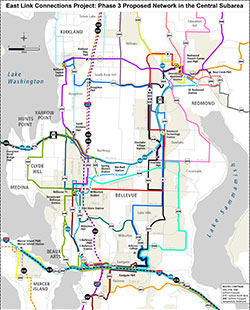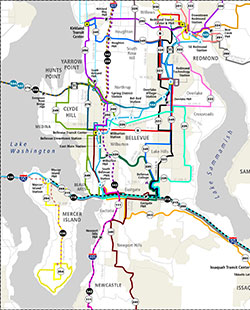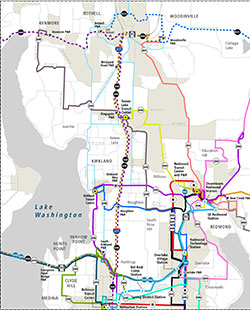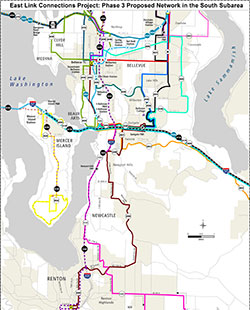East Link Connections
East Link Connections is a coordinated, co-led process for improving transit connections throughout the Eastside as Link light rail service expands.
The East Link Connections Ordinance was unanimously passed on March 4 by the King County Council.
Project overview
In the coming years, Sound Transit will open 12 new light rail stations connecting downtown Seattle and the Eastside.
To help get people where they need and want to go, King County Metro and Sound Transit created East Link Connections, a mobility project on King County’s Eastside to design and implement a coordinated regional transit network.
East Link Connections will deliver an updated Metro bus and mobility network, integrated with Sound Transit’s new 2 Line linking Seattle, Mercer Island, downtown Bellevue, Spring District, Overlake, and Redmond.
Project Status
At the end of May 2022, Metro and Sound Transit completed a 15-month engagement process for East Link Connections resulting in a Final Network Proposal of bus service changes in East King County.
Intentional effort and care were taken to engage our communities through broad public outreach. Metro and Sound Transit convened a Mobility Board of project-area residents that met during every phase of the project to improve routes and ensure the network addressed community priorities. Additionally, a Partner Review Board of cities, community-based organizations, major institutions and employers met to ensure consistency with regional plans and transportation needs. The current Final Network Proposal responds to existing travel patterns and community-identified priorities, outlined below.
| Provide transit to/from important, community-identified destinations and where needs are greatest, including Seattle, Snohomish County, and major medical centers in the region. |
| Faster travel times to get me where I want to go. |
| Additional and improved connections to new locations |
| More service outside peak periods and more service on weekend, and more consistency between peak and off-peak/weekday and weekend service levels. |
| Make transfers easier by being frequent, safe, and accessible, especially for seniors, riders with disabilities, transit-dependent riders, and long-distance travelers. |
In early 2024, Metro conducted engagement with the project’s Mobility Board, Partner Review Board and local cities to ensure that the East Link Connections Final Network Proposal remains aligned with community priorities. This work included a review of current east King County bus ridership, ORCA business program usage, Rider/Non-Rider scientific survey results specific to east King County, and Park & Ride utilization rates. Adjustments to the final network are included in the route proposals below, and outlined in the project’s Public Engagement Report.
Following consideration by the King County Council, implementation of the approved East Link Connections bus network will begin in fall 2025 with changes serving open stations on the Eastside. Final changes will follow the opening of the full 2 Line connecting to Seattle. Information about the construction of the 2 Line can be found on Sound Transit’s East Link website.
Project goals
- Improve mobility for priority populations, as defined by Metro’s Mobility Framework, including un(der)served populations
- Equitably inform, engage, and empower current and potential customers
- Deliver integrated service that responds to Link expansion
- Minimize duplication of bus service with Link
- Improve connections to Link
- Be consistent with Metro Connects, and current and future mobility needs
Final Network Proposal
As presented, the proposed East Link Connections network makes significant progress toward achieving the key mobility needs identified through public engagement and confirmed by the Mobility Board and other project partners.
Final network highlights include:
- More frequent service on eight routes in the project area
- 23 of 24 project area routes provide a direct connection to at least one Link light rail station
- Improved access to frequent transit for 30,364 people (+8%) among the study area population and for 24,359 people (+14%) among priority populations in the study area
- New connections between cities and Link light rail on four routes
- Later nighttime service on four routes
- New weekend service on five routes
- Faster regional connections for Bellevue, Redmond, Issaquah and Renton
- Greater overall transit system reliability with bus and bus-Link service
In addition to the proposed changes to the bus network, Metro is introducing a pilot, on-demand Metro Flex service area in Overlake. This service will provide improved connections to community destinations, schools, and other transit services including Link light rail.
| Route (PDF) |
Description |
|
Bellevue Transit Center to Redmond Transit Center |
|
|
1st Ave W/W Mercer St to Mount Baker Transit Center |
|
|
Maplewood Heights to South Bellevue Station |
|
|
Issaquah Highlands P&R to South Bellevue Station |
|
|
Mercer Village to Mercer Island Station |
|
|
North Bend P&R to Mercer Island Station |
|
|
Issaquah Highlands P&R to Mercer Island Station |
|
|
Eastgate P&R to Bellevue Transit Center |
|
|
Cottage Lake to Overlake Village Station via Redmond Technology Station |
|
|
Eastgate P&R to Downtown Redmond Station via Overlake Village Station |
|
|
Duvall to Redmond Transit Center |
|
|
Kenmore P&R to Overlake P&R |
|
|
South Bellevue Station to Bellevue Transit Center via Lake Hills and Bel-Red Rd |
|
|
Renton Transit Center to Bellevue Transit Center |
|
|
Kirkland Transit Center to Eastgate P&R |
|
|
South Bellevue Station to Spring District Station |
|
|
Avondale to Bellevue Transit Center |
|
|
Woodinville P&R to Marymoor Village Station |
|
|
Woodinville P&R to Downtown Seattle |
|
|
Marymoor Village Station to Mercer Island Station |
|
|
Bellevue Transit Center to U District Station |
|
|
Mercer Island to First Hill |
|
|
Kingsgate P&R to Downtown Redmond Station |
|
|
Duvall to UW Bothell |
|
|
New Link light rail connecting Lynnwood to Redmond with new stations between Judkins Park Station in Seattle and Marymoor Village Station in Redmond |
|
|
Overlake |
Process and Timeline
King County Metro and Sound Transit facilitated 4 phases of engagement as part of the East Link Connections project. Throughout these phases, Metro and Sound Transit worked closely with a Mobility Board and Partner Review Board to make key network decisions.
Mobility Board
Metro has brought together a 27 member East Link Connections Mobility Board that equitably represents groups of people historically left out of decision-making conversations related to transit, and who are disproportionately affected by these decisions. The Mobility Board’s primary role is to collaborate with Metro staff to develop and refine a coordinated regional transit network in the study area covering large parts of East King County.
Partner Review Board
In addition to Metro’s individual engagement with project partners and stakeholders, Metro has also brought together a team of external stakeholders to serve as a concept review board, known as the Partner Review Board. The Board includes representatives from jurisdictions and major institutions in the project area, leaders of community-based organizations and representatives from partner transit agencies. The Partner Review Board’s primary role is to inform, review and provide comment on service concepts developed by the Mobility Board.
Working alongside the Mobility Board and Partner Review Board throughout the engagement phases gave our team a better understanding of the mobility needs and priorities of diverse communities on the Eastside. A summary of each phase of engagement is available below.
King County Metro and Sound Transit held interviews with 20 Eastside community-based organizations, cities, and employers. Additionally, over 1,200 community members provided feedback through an online survey. The feedback received during this phase of engagement provided the framework used by service planners to develop the Draft Service Network that was subsequently reviewed in Phases 2 and 3 of engagement.
Metro and ST shared the Draft Service Network with the public to request help refining the proposed changes. More than 2,000 people engaged with us through in-depth conversations with community-based organizations, local employers, mobility groups, and a public survey. Participants shared their comments and suggestions regarding more than 50 bus routes with proposed service changes. This feedback helped our team learn more about which proposed route changes would be most effective and which needed more refinement.
After refining and making changes to the Draft Service Network based on community feedback from the previous phase, a third round of community engagement was launched to gather final input on the updated network, including a final online survey. This proposal also went through a review process with the Mobility Board, Partner Review Board and community-based organizations.
King County Metro and Sound Transit teams incorporated feedback from the 3 rounds of engagement into the Final Network Proposal.
Due to delays with the opening of the East Link Extension, Metro is meeting with project partners to ensure the proposed East Link Connections network that it continues to meet community needs. Metro will engage its Mobility Board and Partner Review Board to address any changes in mobility needs that may have occurred since finalizing the network in 2022.
The final network proposal is pending action by the King County Council, submitted in February 2025. To learn more about the public engagement process, please review the Public Engagement Report.
 Translate
Translate





